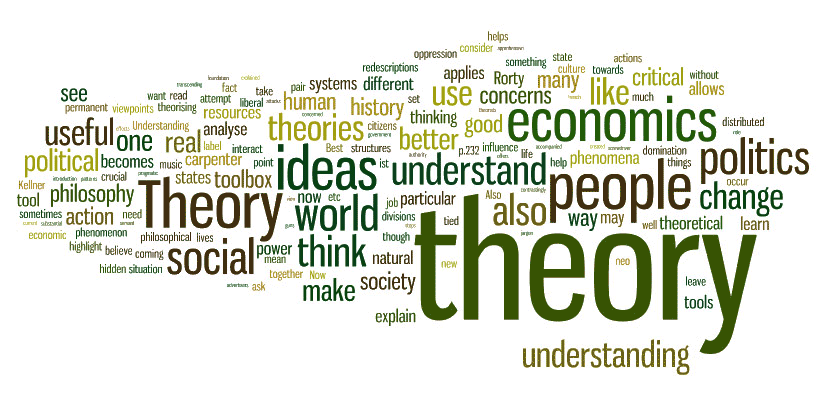“Theory is not like a pair of glasses; it is rather like a pair of guns; it does not enable one to see better, but to fight better.” (Merquior discussing French philosopher Michel Foucault’s view of the use of theory)
What is theory?
Theory is a set of ideas based on a framework to explain a phenomenon, or more simply put its how and why I think something happens. There are theories of everything, but for this introduction we are talking about political, economic and social theory as well as philosophical ideas. These types of theory are pretty self explanatory, political theory concerns itself with politics and political ideas, economics concerns itself with economic systems and how they operate and social theory concerns itself with how society is organised and operates, philosophy is more abstract and concerned with the way we learn, think, analyse as well as theories of existence and what it means to be human amongst other things. Needless to say these theories often overlap and influence each other. There is also approach called political economy which studies many theories together, in particular economics and politics in an attempt to show how these theories interact and influence real life. The main use of theory in our opinion is as a toolbox for developing a critical mind.
Theory as a critical tool
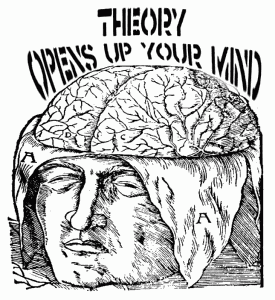 Theory is very useful for making you think critically about history and the current situation. It can highlight hidden power structures, explain why certain phenomena occur which can make you look at the world from a different perspective. Most importantly it helps you develop a critical outlook and allows you to analyse history from a variety of perspectives. Understanding theory is very much tied up with understanding history, it would be almost impossible to understand the development of western society without understanding the capitalist model of production. Theory can help explain so many factors of our history and the situation we are now in and this is where it is it’s most useful. It uncovers patterns, causes, effects and hidden social structures. Theory covers such a vast range of ideas all coming from differing viewpoints and if you consider post modernism that attacks theory as a concept itself, then you can see how varied it is. This is useful though as it gives you multiple viewpoints to consider the same phenomena, it can highlight why people took the actions they did, it helps you to understand the world.
Theory is very useful for making you think critically about history and the current situation. It can highlight hidden power structures, explain why certain phenomena occur which can make you look at the world from a different perspective. Most importantly it helps you develop a critical outlook and allows you to analyse history from a variety of perspectives. Understanding theory is very much tied up with understanding history, it would be almost impossible to understand the development of western society without understanding the capitalist model of production. Theory can help explain so many factors of our history and the situation we are now in and this is where it is it’s most useful. It uncovers patterns, causes, effects and hidden social structures. Theory covers such a vast range of ideas all coming from differing viewpoints and if you consider post modernism that attacks theory as a concept itself, then you can see how varied it is. This is useful though as it gives you multiple viewpoints to consider the same phenomena, it can highlight why people took the actions they did, it helps you to understand the world.
It is action, not theory that changes the world
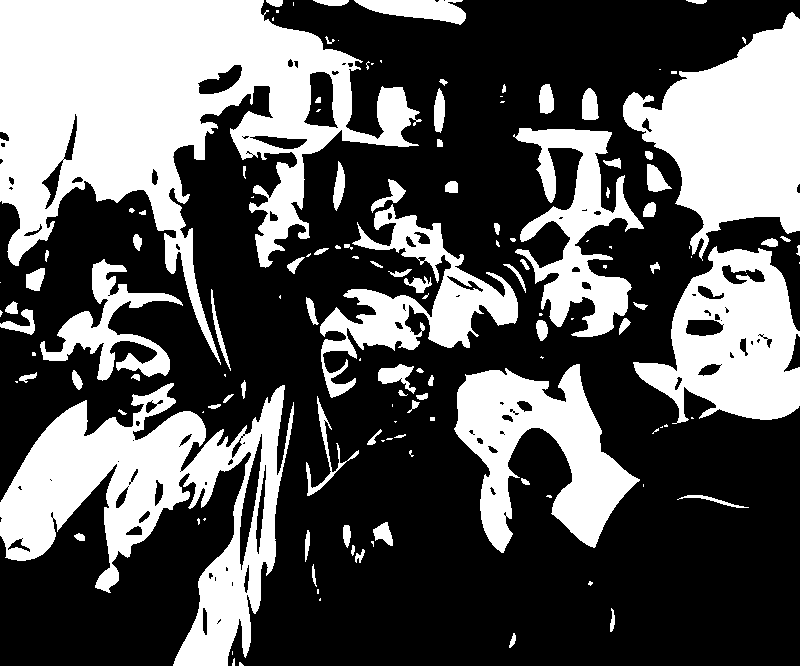 We strongly believe that theory is a tool and one which is useful, but it is like a carpenter and his toolbox, sometimes you use a hammer, sometimes you use a screwdriver for a particular job, the same applies with theory, different tools for different analysis. Also a carpenter becomes good at his job by learning how to use all of his tools, the same applies to theory. Theory is a tool and should be seen as such, many make the mistake of giving theory preference over action, or valuing theorising as an end in itself, a set of carpenters tools do not make a chair it is the active participation of the carpenter that achieves this. This also applies to the theorist as Karl Marx states
We strongly believe that theory is a tool and one which is useful, but it is like a carpenter and his toolbox, sometimes you use a hammer, sometimes you use a screwdriver for a particular job, the same applies with theory, different tools for different analysis. Also a carpenter becomes good at his job by learning how to use all of his tools, the same applies to theory. Theory is a tool and should be seen as such, many make the mistake of giving theory preference over action, or valuing theorising as an end in itself, a set of carpenters tools do not make a chair it is the active participation of the carpenter that achieves this. This also applies to the theorist as Karl Marx states
“the philosophers have only interpreted the world, the point is to change it”
You must ask yourself what is the point of theorising if it has no real application in the real world, theory is not a substitute for action in real life, no matter how good you may think it is. As Rorty (p.232) states,
“When it comes to political deliberation, philosophy is a good servant but a bad master. If one knows what one wants and has some hope of getting it, philosophy can be useful in formulating redescriptions of social phenomena. The appropriation of these redescriptions, and of the jargon in which they are formulated, may speed up the pace of social change.”
Theory allows you to analyse forms of domination and oppression in order to help change the world for the better as Best and Kellner (p.5) state:
“Operating in the tradition of critical theory, we believe that the role of theory is to provide weapons for social critique and change, to illuminate the sources of human unhappiness and to contribute to the goal of human emancipation.”
The tyranny of the ‘ist’
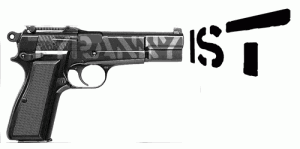 Also theory is no replacement for pragmatic thinking, it should not cloud the moment that you are in, do not let it get in the way of the changing things for the better. This can be a trap that many fall into when they take on the label of an ‘ist’, I am an anarchist, a communist, socialist etc. Not taking away from any of these theories and ideas, as they have lots to offer, but is it useful to define your all your actions by a label or can this be restrictive way of thinking. This can lead to divisions as people become so tied up in theoretical arguments that it stops collaborative positive action from occurring. It would be better if people left the labelling to the advertisers. Ii is best to think of people as being people that have been inspired by theoretical ideas, but they are people first and if they are drawn towards those ideas, then hopefully they are good people with sound morals. Is it possible to transcend theoretical divisions or are we destined to live in our small enclaves, while those who exploit the world and its people maintain their dominance. It will only be through a coming together of enough people that we have the power for substantial social change to occur and this will mean transcending out ideological constraints. It is also pertinent to consider what C.S. Lewis stated about tyranny,
Also theory is no replacement for pragmatic thinking, it should not cloud the moment that you are in, do not let it get in the way of the changing things for the better. This can be a trap that many fall into when they take on the label of an ‘ist’, I am an anarchist, a communist, socialist etc. Not taking away from any of these theories and ideas, as they have lots to offer, but is it useful to define your all your actions by a label or can this be restrictive way of thinking. This can lead to divisions as people become so tied up in theoretical arguments that it stops collaborative positive action from occurring. It would be better if people left the labelling to the advertisers. Ii is best to think of people as being people that have been inspired by theoretical ideas, but they are people first and if they are drawn towards those ideas, then hopefully they are good people with sound morals. Is it possible to transcend theoretical divisions or are we destined to live in our small enclaves, while those who exploit the world and its people maintain their dominance. It will only be through a coming together of enough people that we have the power for substantial social change to occur and this will mean transcending out ideological constraints. It is also pertinent to consider what C.S. Lewis stated about tyranny,
“Of all tyrannies, a tyranny exercised for the good of its victims may be the most oppressive. It may be better to live under robber barons than under omnipotent moral busybodies. The robber baron’s cruelty may sometimes sleep, his cupidity may at some point be satiated; but those who torment us for our own good will torment us without end, for they do so with the approval of their own conscience.”
Overcoming the ‘confirmation bias’
“I have never been a Freudian, I have never been a Marxist, and I have never been a structuralist” (Foucault)
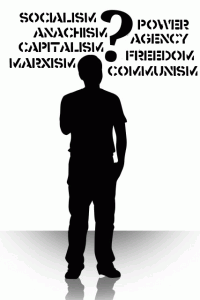 In order to foster truly critical thinking one has to be constantly aware of the confirmation bias and its effects. Quite simply, the confirmation bias ‘refers to a type of selective thinking whereby one tends to notice and to look for what confirms one’s beliefs, and to ignore, not look for, or undervalue the relevance of what contradicts one’s beliefs’. For example, people tend to read literature, browse websites and seek information that affirms their views, in addition to socialising with people who think in similar ways. This can have serious consequences as our conception of the world is then mentally shaped to fit the ideology / world view that we subscribe to.
In order to foster truly critical thinking one has to be constantly aware of the confirmation bias and its effects. Quite simply, the confirmation bias ‘refers to a type of selective thinking whereby one tends to notice and to look for what confirms one’s beliefs, and to ignore, not look for, or undervalue the relevance of what contradicts one’s beliefs’. For example, people tend to read literature, browse websites and seek information that affirms their views, in addition to socialising with people who think in similar ways. This can have serious consequences as our conception of the world is then mentally shaped to fit the ideology / world view that we subscribe to.
To develop critical thinking you should seek to constantly challenge your ideas and question your ideological affiliations. It can prove helpful to seek out literature that provides alternative conceptual frameworks and provides a challenge to your current weltanschauung (World view, philosophy of life, the framework through which to interpret the world). It may also be beneficial to associate with others who challenge your assumptions and who can subject your ideas and analyses to rigorous examination.
It is easy to be dogmatic in ones thought, but it takes mental fortitude to construct a critical mindset and to develop an open mind about the theories and ideas that you find intellectually satisfying. Crucially, though, remain open to new ideas, avoid dogmatism, embrace complexity and regularly question your own assumptions and seek to falsify rather than affirm your views.
Why a Permanent Culture Now needs theory
To work towards a permanent culture now we need a massive toolbox. Theory as defined at the beginning becomes part of that toolbox. In particular it is Political Economy, which as it name states is the exploration of how politics and economics interact. This is crucial to the ideas of a permanent culture now because they rely on how scarce resources are distributed. As politics defines who has the power, authority and control over resources and economics concerns itself with how these resources are distributed then you can see its relevance.
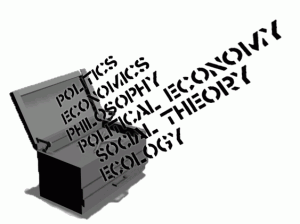 Now it is not only having an understanding of politics and economics that is important, but also having an understanding of the ideas that sit behind the politics and economics, for example you have to understand neo liberal economics and the politics that accompanied this to understand where we stand today, but if you also understand the philosophical basis for this it offers the bigger picture. There are those who will state to you that neo liberal economics is natural phenomenon, a natural outcome of our human nature, when in fact this is not true as economics is just a theory like any other, the fact that it dominates much of our lives does not make it natural. It is these assumptions and fallacies that need to be challenged and discredited through our use of theory.
Now it is not only having an understanding of politics and economics that is important, but also having an understanding of the ideas that sit behind the politics and economics, for example you have to understand neo liberal economics and the politics that accompanied this to understand where we stand today, but if you also understand the philosophical basis for this it offers the bigger picture. There are those who will state to you that neo liberal economics is natural phenomenon, a natural outcome of our human nature, when in fact this is not true as economics is just a theory like any other, the fact that it dominates much of our lives does not make it natural. It is these assumptions and fallacies that need to be challenged and discredited through our use of theory.
It is also crucial to attempt to make theory accessible and this does not mean dumbing it down, though contrastingly, you could argue that some people intellectualise up and take a whole book to say something that could be explained in ten minutes over a cup of tea. People can be apprehensive of theory and ideas, thinking it has no meaning in their lives, yet it is this lack of understanding that allows systems of domination and oppression to continue to act without criticism.
Understanding theory and all its terms, is like being able to read music, once you understand it opens up a new world of understanding. It is also like music in that once you learn the basics, the foundation the rest of it becomes easier to understand. If you think that theory has no real impact on the way people think about society then why has there recently been an attack on the social sciences funding in the UK. These courses in politics, sociology, philosophy, economics etc. may not have created new employees for the workplace, but they did create more and more informed citizens. Citizens who have the ability to demand change from systems they see as unfair, you have to ask yourself the question why would you not want a society full of politically engaged citizens, why would the government not want that.
I will leave that one for you to formulate your own theory about, but if the conclusion does not leave you wanting to learn more about theory then I don’t know what will.
References:
All the theorists we have ever read.
God in the Dock – C.S.Lewis
Foucault – quoted in Politics, Philosophy, Culture: Interviews and Other Writings, 1977-84, 1988
Philosophy and Social Hope – Rorty
Richard Rorty and Postmodern Theory – Steven Best and Douglas Kellner

